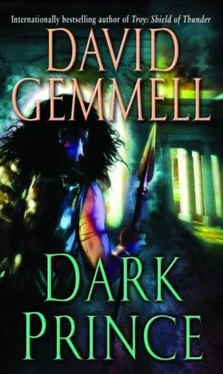Parmenion was confident that his wild Thessalians could turn the Persian cavalry on the beach, protecting the left, and had great faith in the skills of the Agrianian archers guarding the foothills on the right. But everything now depended on the Macedonian cavalry breaching the enemy centre. For, if the Persians were allowed to sweep forward, sheer weight of numbers would cleave like a spear through the eight deep ranks of the infantry.
The Spartan cleared his throat, but could not raise enough saliva to spit. All rested now on the courage and strength of Alexander.
* * *
Alexander tightened the straps on the iron buckler at his left forearm, then knotted Bucephalus' reins. From here on he would control the war-horse only with his knees. Philotas called out and Alexander turned to see Persian cavalry on the right moving into the foothills. Glancing back, he saw the bowmen moving out to intercept. He hawked and spat, clearing the dust from his mouth; then drawing his sword he raised it high above his head and kicked Bucephalus into a run for the river. The Companion cavalry, led by Philotas, Cleitus and Hephaistion, raced after him. Arrows and stones flashed by the King's head as he charged, but none of the missiles touched him as Bucephalus splashed into the water, sending up great arches of spray.
Thousands of Persian horsemen rode to meet the Macedonian attack, and Alexander was the first to come into contact. With a wild cut he hammered his blade into the shoulder of a silk-clad rider and the man fell screaming into the mud-churned water.
The Persians wore little armour save brocaded breastplates, and the Macedonians surged through them to the far bank.
'Kill! Kill! Kill!' roared Alexander, his voice carrying above the ringing clash of battle. As the King pushed on a lance clanged from his breastplate, tearing loose a gold-embossed shoulder-guard. Alexander ducked under a slashing sabre and disembowelled the attacker.
At the top of the slope the King reined in his mount and cast a swift glance to his left. Darius' renegade Greek mercenaries had countercharged against the Macedonian infantry and the two forces were battling at the centre of the shallow river, all formations lost. Behind the Greeks stood the Persian Royal Guards, poised to follow the mercenaries into the attack. Instantly Alexander realized that were they to enter the fray now the Macedonian centre would be sundered.
Swinging Bucephalus, Alexander charged at the Guards, the Companion cavalry desperately trying to support him. It was a move of dazzling courage and the Macedonians struggling in the water saw their King, single-handedly it seemed, cleaving his way towards the Persian centre.
A great cry went up and the phalanxes surged forward.
Alexander, wounded on both arms, continued his advance, for he had caught sight of his enemy, Darius, standing in a golden chariot drawn by four white horses. The Persian King was tall and fair, his golden beard long and tightly curled. Upon his head was a conical crown of gold set upon a silver helmet. A white silk scarf was bound about his face and neck, flowing down over a cloak of silver thread.
'I see you, Usurper!' bellowed Alexander. Hephaistion and the Companion cavalry came alongside the King, protecting his flanks, but once more Alexander urged Bucephalus forward. The Persian Guards fell back before the ferocity of the charge, a great heaving mass of men jostling before the chariot of their King.
On the far side of the field, Berin and his Thessalians had broken through the Persian ranks and were sweeping to the right in a bid to reach Alexander.
Dismayed by the onslaught, the Persians struggled to forma fighting square around Darius. Alexander saw the Persian monarch snatch up a spear and try to turn his chariot to face the invader, but the white horses — alarmed by the noise and the smell of blood and death — panicked and bolted, drawing the golden chariot clear of the field. Darius fought to control the maddened beasts, but it was beyond his powers and the chariot sped towards the north.
Seeing their King apparently fleeing the battle, many of the Persians fled with him, opening huge gaps in the ranks.
Thessalian riders burst through them to link with Alexander.
Within moments the battle became a rout, Persian foot-soldiers running for the hills, throwing away swords and shields as they went. Whole regiments which had not yet come into the battle retreated back towards the relative safety of the town of Issus.
As the sun reached noon only the last of Darius' Royal Guards offered any resistance, but these few were swiftly overcome and slain. Just under 3,000 renegade Greek mercenaries laid down their weapons and offered to surrender to Alexander. But the King refused.
'You have betrayed your nation,' he told their messenger. 'You have fought on the side of the Usurper against the avenging army of Greece.'
'But we are mercenaries, sir,' the messenger replied, his face pale under his tan. 'It is our way. Darius offered to hire our services and we served him loyally. How can you call us traitors when we are only following our calling?'
'He paid you to fight,' answered Alexander coldly. 'So fight. Pick up] your weapons and earn your pay.'
'This is madness!' cried the messenger, turning to seek support from Alexander's generals.
'No,' hissed the King, 'this is madness.' And stepping forward he rammed his dagger into the man's neck, forcing the blade up under the chin and into the brain. 'Now kill them all!' he screamed.
Before the mercenaries could gather up their weapons the Thracians and Macedonians surrounding them rushed in, hacking and cutting. Drawing his sword Alexander ran in among them, his blade plunging into the back of the nearest renegade. With a wild roar the entire army descended on the mercenaries, cutting and stabbing until not one enemy soldier was left standing.
One by one the Macedonians fell back from the slaughter until only Alexander, blood-drenched and screaming, ran among the dead seeking fresh victims.
A terrible silence settled on the army as they watched the King's frenzied dance of death among the slain.
Hephaistion, who had taken no part in the slaughter, walked forward to speak softly to Alexander, who sagged into his friend's arms and was helped from the field.
Aida was content as she sat under the shade of an awning, her gaze resting on the glittering sea far below. The castle here was built on a towering cliff above a small village that nestled between two bays. From where she sat Aida could see only the smaller bay, a sheltered cliff — protected bowl where ships could anchor to escape the winter gales that raged across the Aegean.
A trireme was beached in the bay, its huge sail furled, its three banks of oars drawn in. It sat on the beach like a child's toy and Aida watched as several sailors leapt ashore and an officer began the long walk up the winding cliff-path to the castle.
The sea air was fresh and Aida drew in a deep breath. She could taste the Dark God's power upon her tongue, feel his swelling presence in the air around her, blowing on the sea breeze from Asia. She licked her lips, revelling in dreams of tomorrow.
There were those who talked of good and evil. Foolish notions. There was only strength and weakness, power and helplessness. This was at the heart of all the Mysteries she had so painfully learned during her long, long life.
Earth magic could prolong life, extend strengths, earn riches for the man or woman who understood it. But earth magic required blood and sacrifice; it needed screaming souls to feed it.
This much had been understood since the first rays of the first dawn. Throughout history the wise had known of the power of sacrifice. But only the true initiates understood the nature of the power released.
Читать дальше












